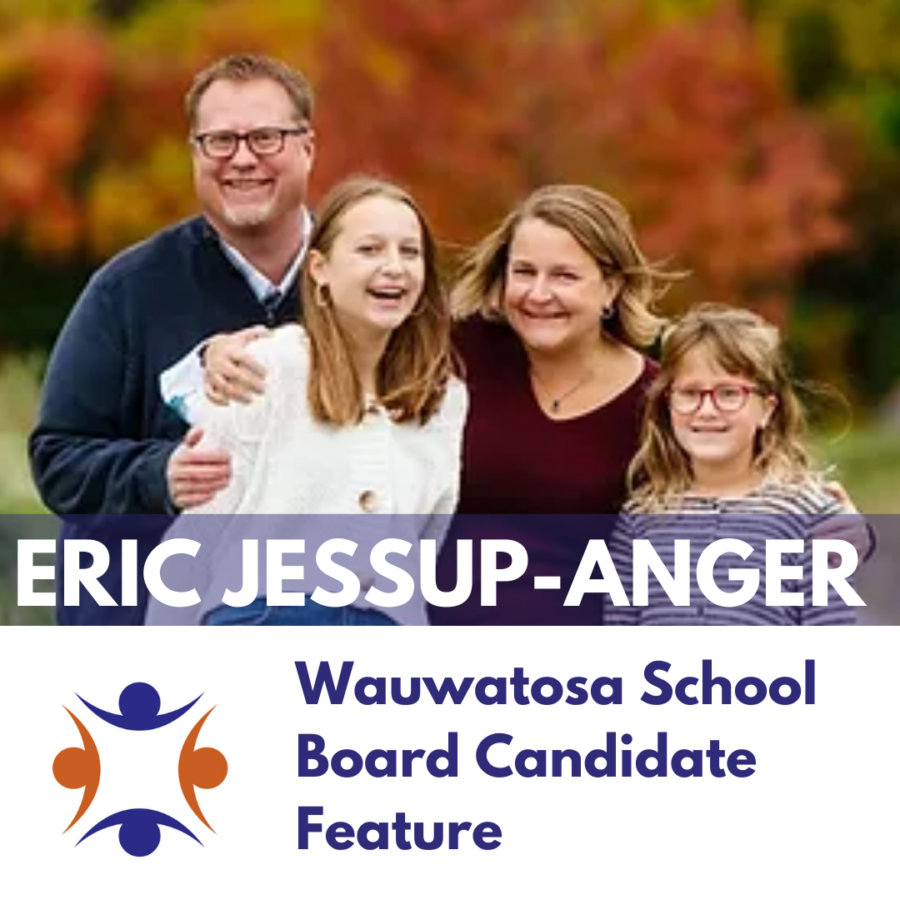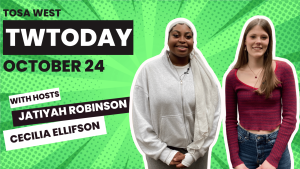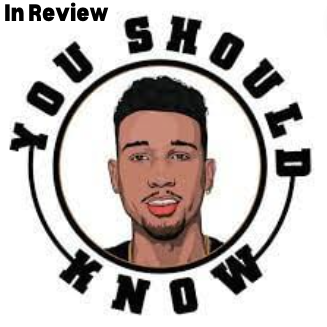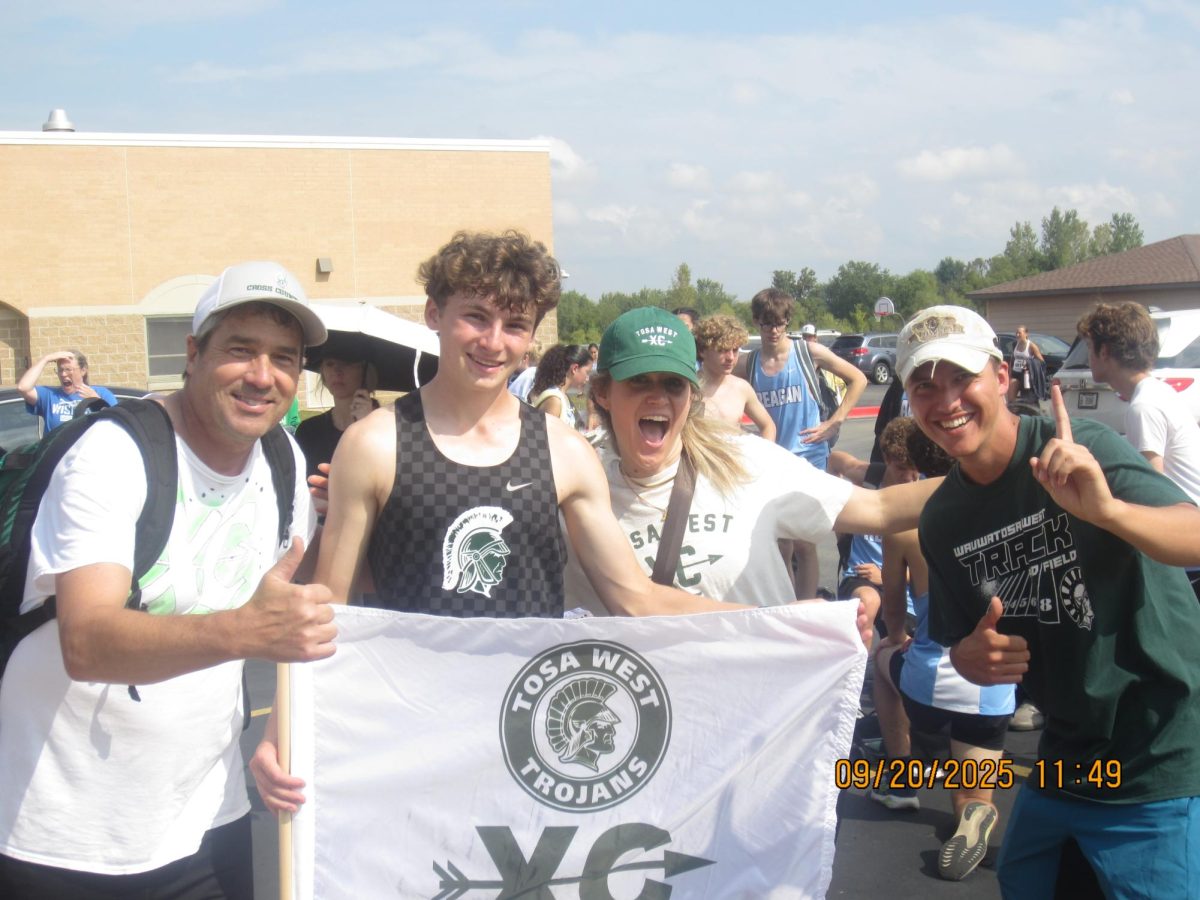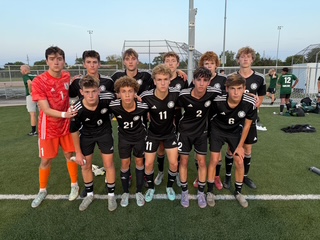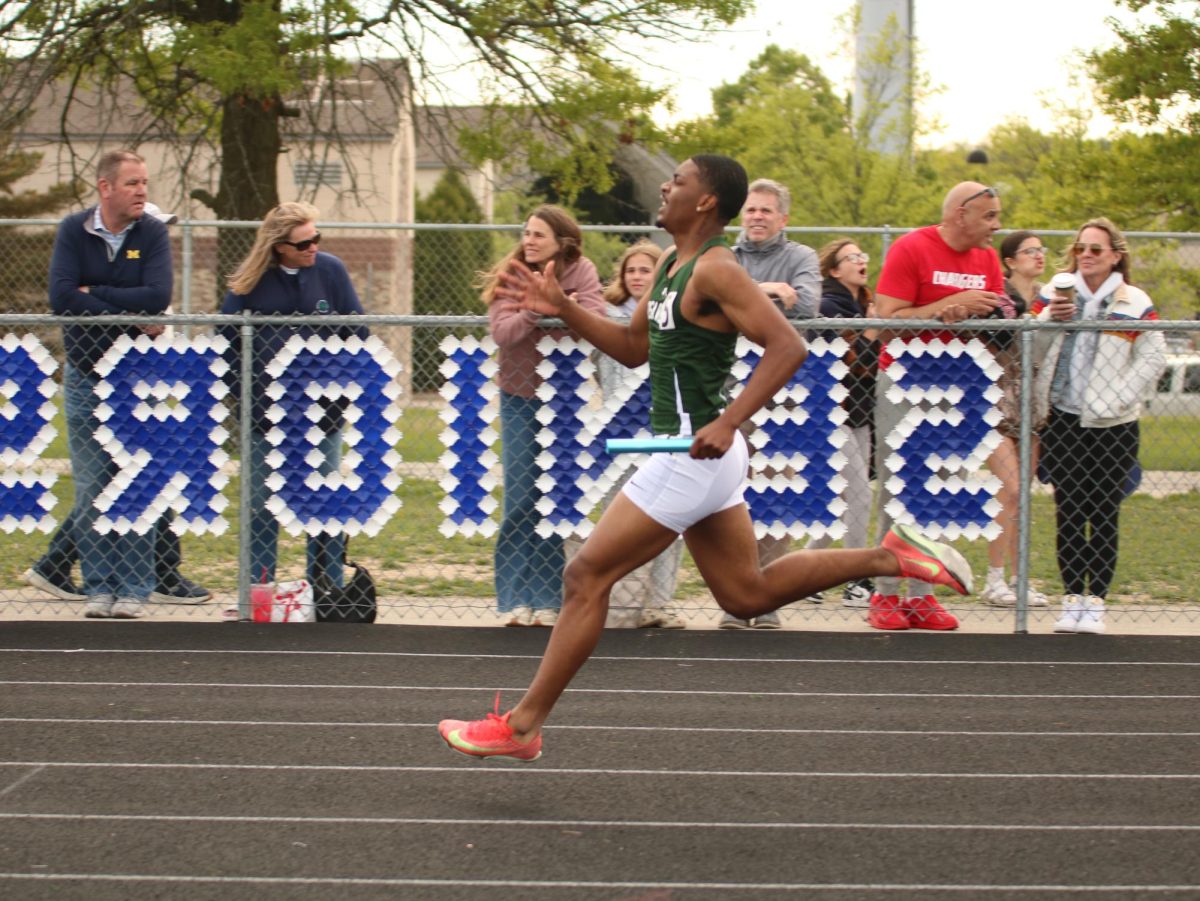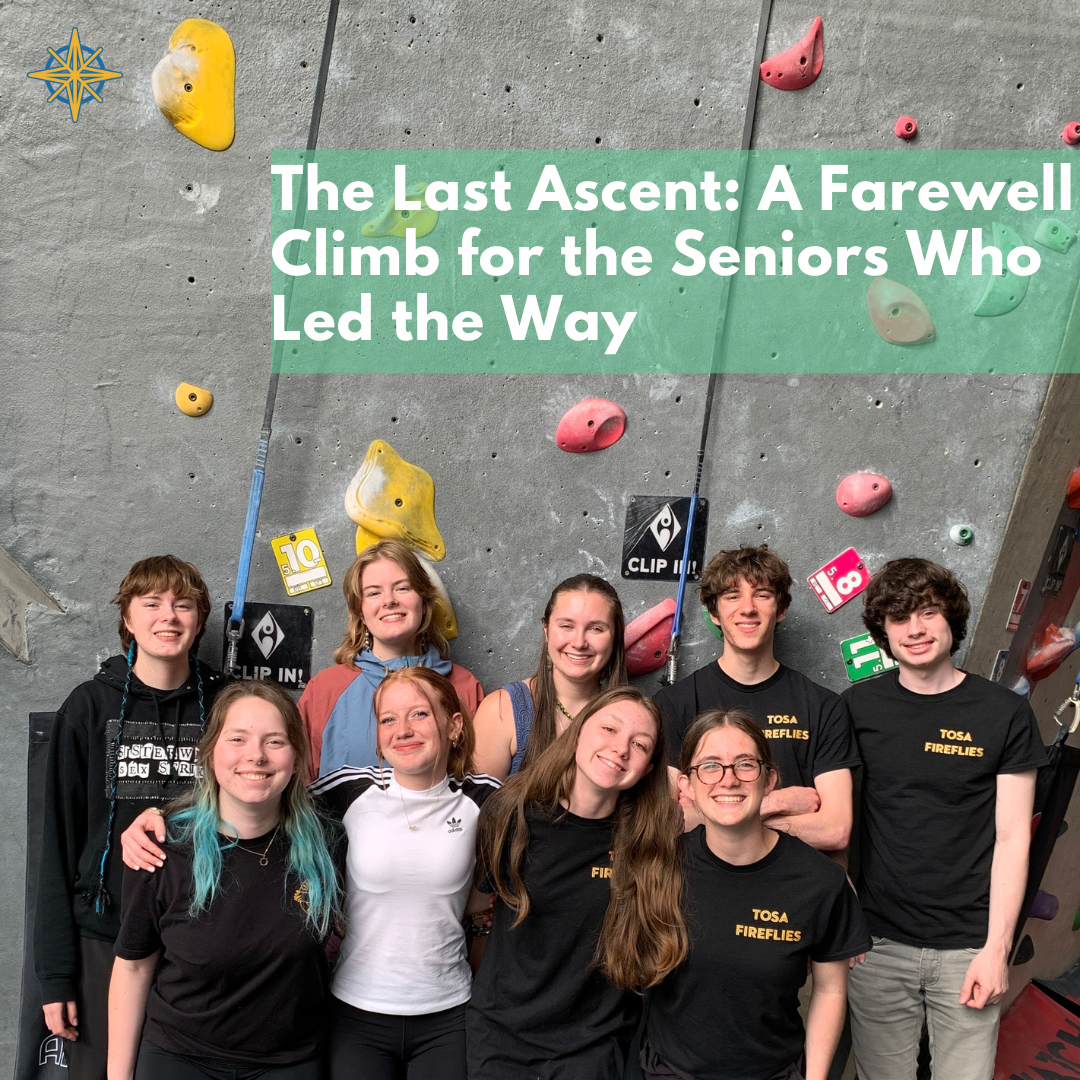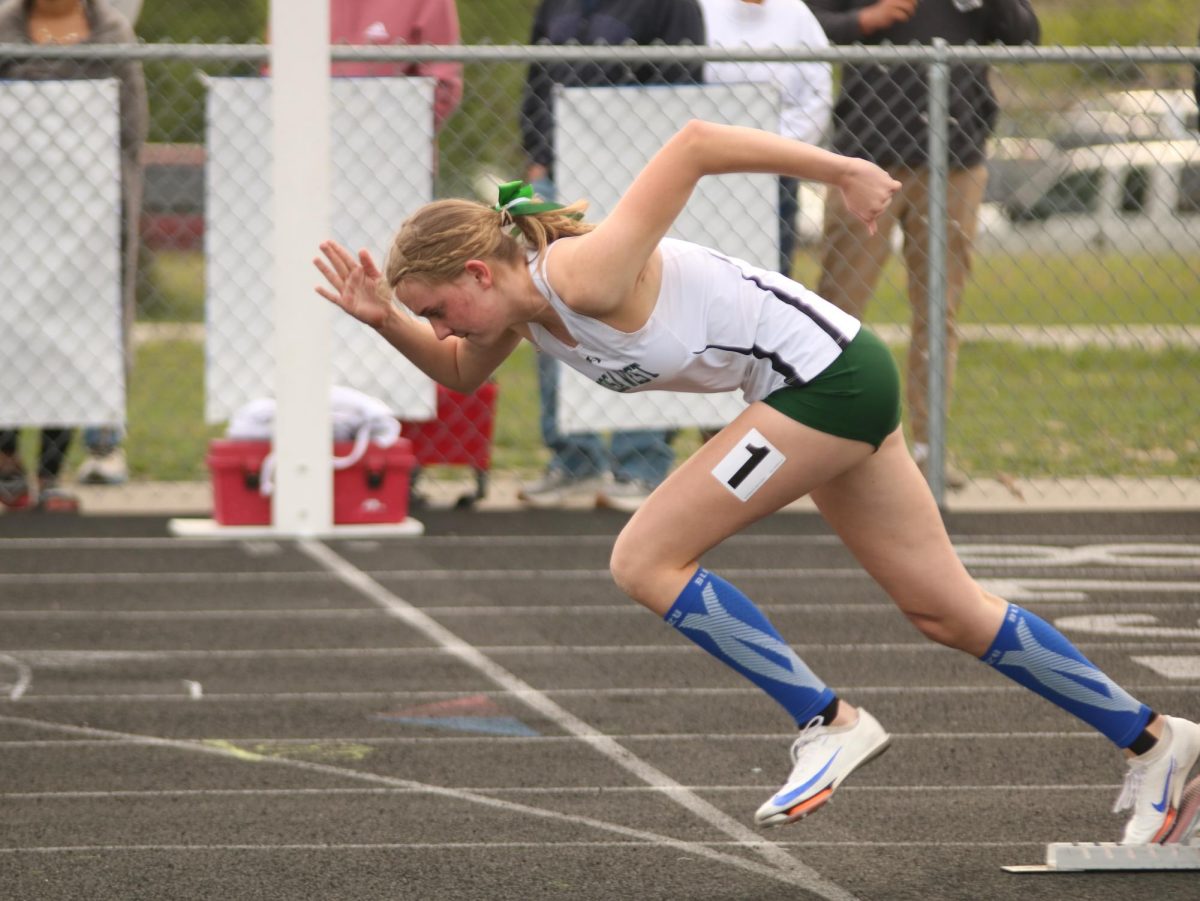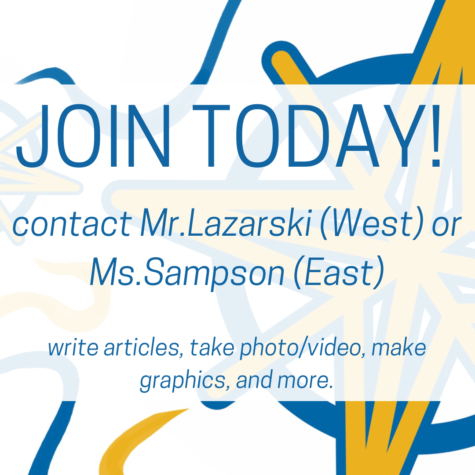School Board Candidate Feature – Eric Jessup-Anger
March 31, 2022
Dr. Eric Jessup-Anger is up for re-election to seat 3 of the school board. He has two children who attend Wauwatosa schools. His top priorities include learning equity, providing mental health resources and support, family engagement and reimagining middle school.
What is your connection to the Tosa community?
“I moved to Wauwatosa in 2011; my wife and I both did doctorates at Michigan State University. I grew up in Wisconsin and she grew up in Colorado. She teaches on the faculty of the School of Education at Marquette, and had a couple colleagues who lived in Tosa… we literally experienced East Tosa Halloween and were so enamored with the community engagement and it kind of opened us to the friendliness [and] comradery of our friends who lived here. They all knew their neighbors, they raved about the schools. We were able to find a house, buy one in 2011, and at the time [our] oldest daughter was in first grade, so we got involved as parents at Roosevelt Elementary School… volunteering in the school and the classroom, doing things of that nature. When our second daughter was of school age we continued to get involved in those sorts of things. The thing I love about Wauwatosa is its sense of community engagement, of people volunteering, of community based activities, and opportunities to get connected and involved. It’s a place where you can’t avoid people. The houses are right next to each other, and so from block parties to celebrations to walking your kids to school, I think it’s just been a great place to raise a family, see people, and find ways to make the community better.”
One of your priorities you want to focus on in the next term, if elected, is mental health resources. What do you think is the most effective way to improve the mental health of students?
“I think there are a couple things. I’ve certainly done some research on this. In my career I study and work in colleges and universities. For the last 20-25 years, I’ve been working with students, directly or indirectly… supporting them through mental health challenges… at the college level. So I’ve been thinking about this and engaging with these issues and opportunities for a long time. When I think about my work on the board and why mental health has been a priority – and it has been a priority for me [since] before the pandemic – it’s the [question of] ‘how do we create opportunities throughout the school system and community that support families and support kids, and normalize needing mental health supports?’ The mental illness, the different challenges the kids are facing – it is appropriate, necessary, essential, that when you need help, that there are resources in place.
“Things that I think about are: how do we take a look at our curriculum right now through advisory… when guidance counselors are doing things at [the] elementary, middle and high school level? There is some really neat stuff coming out on biological behavioral therapy… how do we integrate some of these resources into the curriculum to help students develop more resilience and develop additional skills and capacity for when things are difficult so that they have the capacity to navigate those things? We have also done a lot of work on the legislative advocacy committee during my time on it, and I’ve been working on this really hard to advocate for more financial resources from the state to make sure we have enough counselors, therapists [and] social workers available in schools. I think we need to find ways to be more proactive… helping to support kids before they are in crisis. Partnering with Aurora [Healthcare], with Children’s [Hospital of Wisconsin], with Rogers [Behavioral Health] and other places can help bolster some of the things we are doing. And we need to make sure we are providing these resources within school settings. I am really excited Dr. Means came back with the extra resources, with the initial money from the federal government to provide more immediate support for the next two years. I’m looking forward to supporting that within the coming weeks.”
Another priority of yours is re-imagining middle school. What in your opinion are the shortcomings of the current system and how can it be improved?
“So [for] this one I have a little different of an answer. I’m not sure what the shortcomings are. My general sense is that students during the middle school years are less engaged [and] less excited about being in school. There is more peer pressure creating more anxieties; students are engaging in some dangerous decision making. I would love to reimagine it with the community – with students, with teachers, with kids. And say ‘What are we, sixth, seventh and eighth grade?’ Middle schoolers are a tough audience. What are the types of things that should be in the curriculum? What type of learning should be happening? What types of community involvement or engagement? So what does this look like? What are schools around the country doing, where we are seeing students both learning a lot and energized and excited about curricular and cocurricular offerings? I think about my kids, things that they love, like the wolf debate, [kids were] really excited about that. [Or] about some of the clubs and organizations that were exciting – from doing ski nights to doing Destination Imagination [or] theater productions. So there are things that get kids excited about. I think we just need to imagine.
“This is happening in Wauwatosa, but it’s [also] happening nationally. Middle school we haven’t quite figured out yet. One specific thing I would like to do is to find ways for families to be more engaged in the middle school experience. [In] elementary schools, because they are neighborhood schools, families are really involved and engaged. I volunteered this morning at ‘sweet-treat’ which was a big [tradition] at Roosevelt with donuts on the playground and I would love to find ways to support the teachers and staff in the middle schools to make sure that they’ve got the resources where they can do traditions that bring the community together. [I would love] different curricular innovations where the kids say, ‘You know what? I’m going to do this science project that I’m really excited about. I’m going on this field trip to this place [that] I’m really looking forward to’. I want kids learning as much as they can so they are ready for high school, but I want them excited and still loving school. Sometimes [with] middle school, school is not exciting like it was in elementary school [and] less exciting than high school where you have more freedom [and] more variety of classes you can dig into. I want our middle schools to be places where people from around the country visit and are like, ‘Wow, there is some really great stuff happening around here. Kids are engaged, families are engaged, kids are supported and they are learning, and there is some really great energy in the building’.”
What made you want to run for school board originally and why are you running again?
“As a senior in high school I got to moderate our school board debates in our home town and it was such a fascinating experience, as a high school student, to hear them discuss and debate me. I was a student and they were talking about my school, my classes and my experience. Some of them I thought were really connected, and some I thought, ‘I’m not sure my experience and what you are talking about are the same thing,’ so that, in some ways, really stuck with me.
“My career has all been spent in education. I originally wanted to be a high school English teacher and a hockey coach but ultimately decided to work with college age students instead. My undergraduate degree is in educationally policy and ed-psych, kind of the art of teaching and how people learn. [As far as] running, I had to run it by my wife and kids because it’s a lot of time and energy. I would be out of the house and not doing stuff with them, [but] it was a way to give back to the community. I spent a lot of time developing expertise, I was really curious. I work really well with others to help solve problems. I care a lot about education. This is a way that I can contribute and give back and help the schools be the best they can be for every kid in the community. I was excited that Tosa was committed to diversity; I was excited that Tosa wanted to make sure that not just kids from wealthy families, not just kids who were A students were getting a great education, but that we were doing everything we could to make sure that every kid got the supports and resources they need to thrive.
“Why do I want to keep doing it? I had to think a lot about that. The last two years on the school board have been hard. It’s been, in some ways, impossible to make everyone happy. As school board president, one of my goals was to keep the community together. I didn’t want this to become an issue of parents upset with teachers. I didn’t want teachers to be scared, parents to be scared, kids to be scared. People were in all different places. I wanted to absorb their fear and anxiety and bring them along so that we could do our best to educate our kids, to support them in their mental health, and to do things in a way that was safe and supportive of the whole school community. Ideally we wouldn’t have had a pandemic. Ideally my two years as school board president would have focused on the things that I cared most about – which is making sure our curriculum is in a really great, healthy place. That classrooms and teachers have everything they need to make sure that students are learning the most they can and that we’re supporting their learning. That we can focus on mental health resources and support, and I want to do those things. I think we are recovering from the crisis of the pandemic. It’s not gone, we will still be navigating it, but I hope that we’re through the crisis components of this. I really want to find ways to help the school district focus on the curriculum, student learning, student success, and make sure schools are supporting and helping every kid thrive.”
What is something you’ve accomplished in the last two years that you’re proud of?
“So one thing that has been really great is the passing of the referendum. We now have schools that kids can navigate if they are in a wheelchair. The classrooms are dynamic places [where] teachers can teach and learn. We’ve also got systems during the pandemic making sure that the air is cleaner than it ever would have been two or three years ago. [I’m proud] that we were able to get donations for the Tosa Aquatic Center. I’m really proud of the work that we have done and pushed forward for equity and supporting students. I’m proud of the work we have done for mental health. Already we’ve advocated and gotten more resources and we’ve developed partnerships with community services, and I think that that stuff has been really great as well. And, I’m really excited that, in the midst of the pandemic, the school board led the search for a really dynamic and outstanding superintendent. We started a whole new generation with somebody who I think will be outstanding [at] setting high academic standards and helping bring our district to a place where we will be a destination for families with kids.”
What was your favorite school subject in high school?
“I had this phenomenal teacher, Mary Risch, I almost didn’t care what she taught. She was just such a dynamic English teacher. From Asian literature, which was a really fascinating course for a kid in a small town in Wisconsin, to English literature… the classes I had with Mrs. Risch were really outstanding. So I’ll go [with] the literature courses I had. I also had a really phenomenal capstone creative writing course, where we did a lot of poetry and short stories, and I think being able to be creative and workshop and get critiques really prepared me for college. It was fun to sit around with people who like to write and to be vulnerable. Writing is hard, and I don’t think most people tell you how hard writing is. And it’s not easy for anybody, it takes editing and work, and feedback is a normal thing. I think I learned some of those things from Mrs. Risch and the environment she had. There were a variety of classes from her, but Asian lit, creative writing, and British lit, were classes that I loved.”
To learn more about Dr. Jessup-Anger’s campaign and platform, visit https://www.jessupanger4tosa.com



